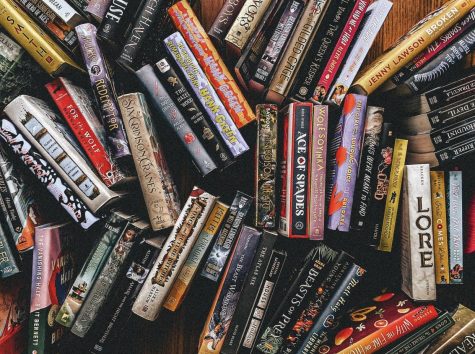Don’t Feel like Reading? Read This.
December 15, 2021

Many students encounter a common enemy at home and in the classroom: reading.
Whether it is for pleasure or for a grade, there are people that do not enjoy reading, not to mention the struggles that neurodivergent students go through everyday.
This makes the question of ‘what are some ways to make reading interesting and tolerable’ pop up.
Reading strategies are a great way to work through a difficult text.
These strategies can also be a gold mine for neurodivergent students because they were made for neurodivergent minds.
Ryleigh Miller, a special education teacher, shares some strategies she uses in class.

“We call it ‘chunking of text’ so that it’s only a couple of sections at a time,” Miller said. “And my favorite strategy, ‘talking to the text,’ actually marking up either directly in the text or, if it’s a school-borrowed book, having notes to the side.”
These strategies allow a student to break up an otherwise long and confusing text into smaller, more manageable chunks. Finding books with smaller chapter sizes is a great way to use the chunking method.
Some other strategies include finding a reading buddy, picking a book with language you can understand and choosing another medium instead of print, like ebooks and audiobooks.
The library is a great place to find any type of medium and subject.
For the audiobook lovers out there, the high school’s library has free resources made available, according to librarian Kayse Corrieri.
“We have one called Librivox. There’s a link from the library home page to it, and it has lots of audio current and classic fiction,” said Corrieri.
The library also has classic novels on iPods that can be checked out.
Going outside your comfort zone may be necessary to find a book that will peak interest. Changing genres or reading levels can open up a lot more options.
At the school’s library, simply checking out the new book cart can be a great start.
Bria Adams, a librarian clerk at the high school, knows great ways to check if a book is for you.
“Every new book that comes in, I read at least the first five pages,” Adams said. “This can give you a quick overview of the book and introduce you to new genres. Also, if a text-heavy book is not your style, the library offers graphic novels.”
Another way to get exposed to different book titles is, believe it or not, the internet.
There are a lot of websites that offer free books you might not find in person.
The SHS Book Club president, Josephine Sedgley, recommends Z-library and online PDFs of books.
If you need book recommendations, she has two methods anyone can use.
“Talk to your friends if they read. Sometimes they can also recommend really good books,” Sedgley said. “If your friends don’t read, sites like Good Reads are great for finding highly reviewed books.”
Reading takes time and mental energy.
It can be strenuous at times, especially if the reading is for an assignment or for work.
Despite the difficulties, the benefits outweigh the hardships.
Heath Hallman, an English teacher at SHS, uses an analogy to explain.
“That’s almost like me saying exercise is a hobby, or going to the gym is a hobby,” Hallman said. “Sometimes it’s not that much fun. Some people love to go to the gym, some people hate to go to the gym, but everybody has to admit there’s a benefit to going to the gym.”

There are so many great stories out there that can grab your attention in so many ways. Whether that is fear, like how “The Shining” leaves a feeling of unease, or wonder, like how the Harry Potter series captivated a generation.
Reading can improve vocabulary, writing skills, reading fluency and an understanding of human nature. It can be a portal to another world all within the convenience of your hands and eyes.
“You can look at a character and see what they’re doing and why they do it and look at their motivations and see the results of their decisions without putting yourself at risk,” Hallman said.